By Mae Thiwari
Bangkok, Thailand --- Mastering Energy Supply for Isolated Areas (MESfIA) 2021 International Conference, hosted virtually by the Asian Institute of Technology (AIT) on August 31 – September 1, 2021, features exhibitions and presentations from 37 speakers in education, public and private sectors from Asia and Europe, drawing 220 participants from around the world.
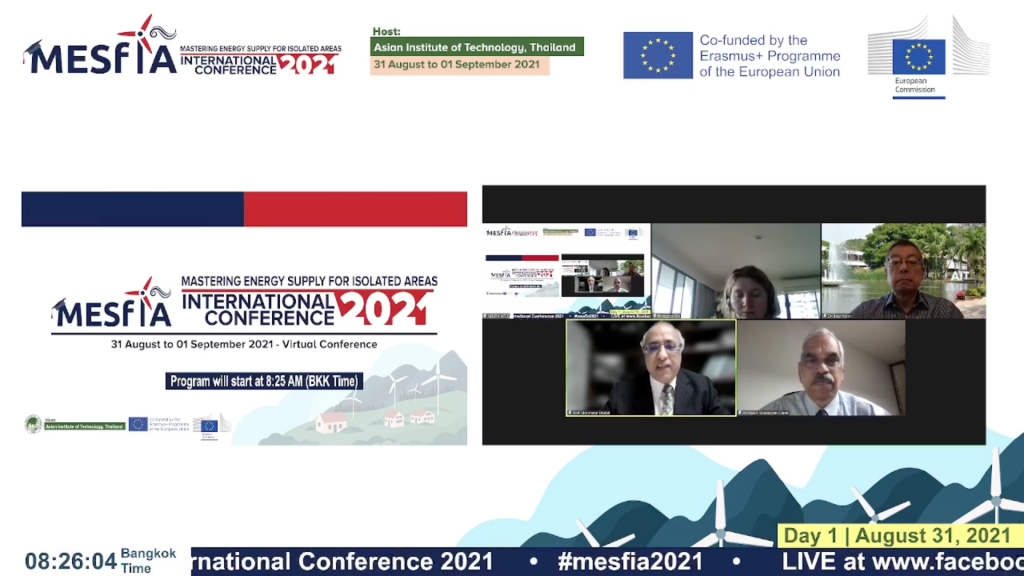
The MESfIA 2021 International Conference is part of the MESfIA project which is co-funded by the ERASMIUS+ Program of the European Commission to provide high quality postgraduate education on energy supply for students and professionals in the energy sector. The conference provides a platform for an effective knowledge and experience sharing between academic and research institutions in the European Union (EU) member and Southeast Asian countries.
The topics covered in the conference include electricity access; microgrids; renewable energy resources utilization; energy access in remote locations, mountainous areas and islands; and clean cooking. Around the world, about 2.6 billion people still lack access to clean fuels and technologies for cooking, and about 750 million people still have no access to electricity. The MESfIA project activities are in line with the Sustainable Development Goal number 7, namely, to ensure access to affordable, reliable, sustainable, and modern energy for all.
After welcoming remarks by the Conference Chair, Prof. Sivanappan Kumar, AIT President Dr. Eden Y. Woon highlighted AIT’s long partnership with ERASMUS and European Commission through capacity building for higher education projects in his opening remarks.
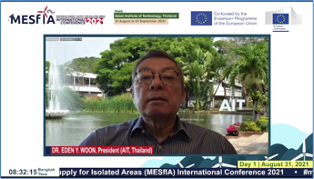
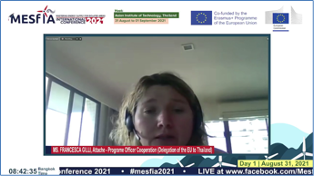
Ms. Francesca Gilli, Attache, Cooperation Department of the Delegation of the EU to Thailand, noted in her speech that the MESfIA Project is at the intersection of many EU policy initiatives on higher education, research and development, and international cooperation and partnerships. The objectives of the project were furthered explained by Dr. Antonios Tsikalakis, MESfIA Project coordinator from the Hellenic Mediterranean University of Greece.
The first keynote address titled “The Last Mile: the longest 21st century Energy Services for Remote Communities” by Dr. Priyantha Wijayatunga, Chief of the Energy Sector Group of the Asian Development Bank (ADB) in Manila, the Philippines, stressed that the energy service provider must prioritize its user’s point of view over that of the energy supplier. He further added that education sector could collaborate with ADB in addressing energy access issues in rural and remote areas through practical research and pilot projects.
Mr. Divyam Nagpal of the International Renewable Energy Agency (IRENA) from Abu Dhabi, UAE, delivered a keynote address on “Renewables for Energy Access in Asia: Key Lessons and Way Forward” where he pointed that solutions to energy should be tailored to the needs of a particular area. He emphasized that in remote areas, renewable-based clean cooking options can play a significant role in bridging the access gaps with significant social economic and environmental co-benefits.
Following the presentations and discussions on the first day, the second day of the conference started with a presentation by Mr. Michael Williamson, the Section Chief of the Energy Division of the United Nations Economic and Social Commission for Asia and the Pacific (UNESCAP) in Bangkok, Thailand, on “Closing the Gap: Insights into Clean Cooking in the Asia-Pacific”. Mr. Williamson noted that clean cooking has not met the target. Complexity of available solutions due to sociocultural, technological, and economic factors, plays an important part. Thus, there is no one size fits all solution, and a tailored approach is necessary. UNESCAP and educational institutions can join forces to close these gaps through collaborative research.
As it has been noted by all keynote speakers the importance of context-based solutions, the panel discussion at the conference provided an interactive platform for representatives from the electricity utility sector in Thailand, Bhutan, Cambodia, Indonesia, Greece, and Spain to share their location-specific experience and knowledge. The speakers provided their insights on various barriers addressed by their countries to provide electricity access and the future challenges of decarbonisation.
The electrification rate in Thailand is 99.72% and the Provincial Electricity Authority is planning to use microgrids with Battery Energy Storage Systems (BESS) in non-electrified islands in Southern Thailand to fully electrify the country. Though Bhutan’s topography, which consists of high mountains crisscrossed by a network of swift rivers, along with its weather conditions, makes it challenging to electrify the nation, the country has successfully addressed their challenges. Indonesia, facing challenges from being an archipelagic country, has a significant number of non-electrified areas as they are geographically scattered. Meanwhile, road access, distance from existing energy infrastructures, few households that can merit licensee investment in remote areas of Cambodia are just some of the main barriers their government is facing to provide electricity access.
Representatives from Hellenic Electricity Distribution Network Operation (HEDNO) in Greece, and Enel Green Power in Spain presented their respective countries electrification and decarbonization plans for its islands and remote locations, particularly Crete in Greece and Canary Islands in Spain.
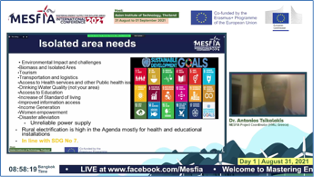
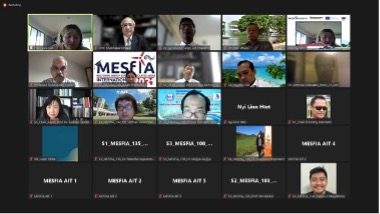
Students, experts and practitioners in energy also presented their research findings on various aspects of the conference theme. Latest energy and power-related equipment, renewable energy device, and energy saving equipment were also showcased by private sector, including ALECOP, EMIN, GEM ORION, QUADRAN and SUMMIT TECHNOLOGIES, in an online exhibition during the conference.
The training needs and skill expectations in the countries to address the energy access include a good command of STEM, understanding of the local needs, problem solving and communication skills, project management/IT skills and logistics to accommodate for difficult infrastructure, and business skills to identify cash flows for implementing energy access projects.
Some key findings from the presentations and discussions were that rural electrification is high on the agenda in the countries, renewables can play a vital rule for rural electrification, biomass and LPG can help in meeting cooking needs, and there are solutions which can enhance our green future especially for those in isolated areas and operate these microgrids.
Overall, the MESfIA 2021 International Conference has brought together stakeholders from financial institution, multilateral organizations, utilities, and universities to discuss energy access issues in remote areas, while sharing recent research in the region as well as the latest technological achievements in the field of isolated power systems.
-----
Resources:
Recorded video of the full conference:
https://www.facebook.com/Mesfia/
Book of Abstracts presented at the conference:
https://www.mesfia.eu/wp-content/uploads/2021/08/MESFIA_BookOfAbstract.pdf
Conference program:
https://www.mesfia.eu/wp-content/uploads/2021/08/MESFIA-ConferenceProgram.pdf
Conference exhibitors:
Conference Organizing Committee
Prof. Shobhakar Dhakal (AIT, Thailand)
Prof. Sivanappan Kumar (AIT, Thailand - Chair)
Dr. Jai Govind Singh (AIT, Thailand)
Dr. Antonios Tsikalakis (HMU, Greece)
Assoc. Prof. Sarintip Tantanee (NU, Thailand)
Dr. Sarjiya Sarjiya (UGM, Indonesia)
Dr.-Ing. Deny Hamdani (ITB, Indonesia)
Prof. Trung Hung Vo (UTE-UD, Vietnam)
Prof. Bich Huy Nguyen (NLU, Vietnam)
Prof. Salvador Suarez (ITC, Spain)
Prof. Georges Zissis (UPS, France)
Ms. Danai Papadimitriou (CWC, United Kingdom)
Ms. Katerina Kostakou (EuroTraining, Greece)
Dr. Tumiran (UGM, Indonesia)
Dr. Rachmawan Budiarto (UGM, Indonesia)
Dr. Husni Rois Ali (UGM, Indonesia)
Dr. Lesnanto Multa Putranto (UGM, Indonesia)

